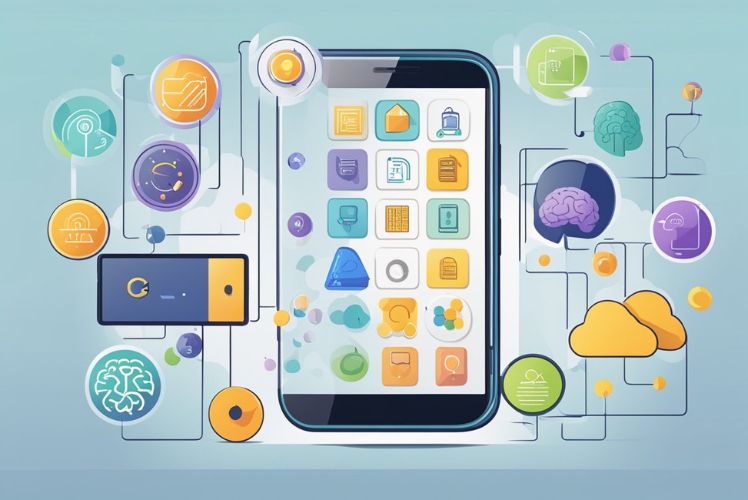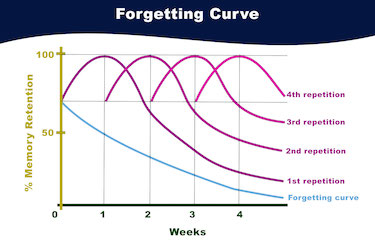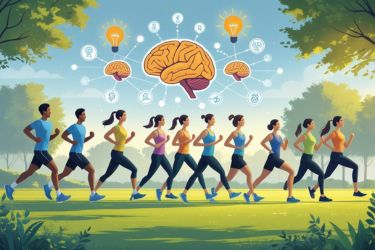The rise of brain training apps has sparked a lot of curiosity about their effectiveness in improving memory. Many of us want to sharpen our cognitive skills and keep our minds agile, especially as we age. While some studies suggest these apps can lead to short-term improvements, the evidence supporting lasting benefits is less clear.
As we explore this topic, we will delve into what brain training really means and how these apps work. We will examine scientific findings that shed light on their capabilities and limitations. Our goal is to provide a balanced view to help us understand whether these tools can genuinely enhance our memory or if their impact is overstated.
In the ever-evolving landscape of technology and cognition, we must consider more than just apps. A holistic approach to mental well-being—encompassing lifestyle choices and mental health—plays a vital role in memory improvement.
Key Takeaways
- Some brain training apps may show short-term memory improvement.
- Scientific evidence remains mixed on their long-term effectiveness.
- Overall brain health is influenced by lifestyle choices and mental well-being.
Understanding Memory and Brain Function
Memory is a key part of our cognitive abilities, influencing how we learn, recall, and apply information. It helps us connect experiences and build knowledge. In this section, we will explore the basics of memory and the role of neuroplasticity in brain function.
The Basics of Memory
Memory can be divided into different types, including short-term and long-term memory. Short-term memory, or working memory, allows us to hold information temporarily for tasks like mental calculations or following directions.
Long-term memory stores information for extended periods, from days to decades. This type includes:
- Declarative memory (facts and events)
- Procedural memory (skills and tasks)
Our ability to recall information is affected by various factors, including attention and emotional significance. Memory isn't just passive; it’s active and involves processing and retrieving information. Effective memory can enhance our daily lives by improving learning and decision-making.
The Role of Neuroplasticity
Neuroplasticity is the brain's ability to adapt and reorganise itself throughout our lives. This process is crucial for learning and memory. When we learn something new, our brain forms new connections called synapses. These changes help us strengthen and improve cognitive abilities.
Factors that promote neuroplasticity include:
- Learning new skills
- Practising memorisation techniques
- Engaging in physical exercise
Neuroplasticity shows that we can enhance our brain function and memory through consistent practice and stimulation. Thus, brain training apps may aid this process by providing engaging ways to challenge our minds and improve our memory skills over time.
The Concept of Brain Training
Brain training focuses on improving cognitive skills through targeted exercises. These programmes aim to enhance our attention, memory, and overall cognitive functioning. By understanding the foundational elements, we can better assess the effectiveness of various brain training options.
Defining Brain Training
Brain training involves structured activities designed to improve cognitive abilities. These may include memory tasks, puzzles, and games that challenge our brain. Unlike traditional learning, brain training emphasises real-time practice and skill enhancement.
The underlying goal is to boost our brain's processing speed and memory capacity. Research suggests that engaging in these activities can lead to short-term improvements in specific cognitive skills. We can enhance our mental agility by regularly practicing these tasks.
Components of Brain Training Programs
Effective brain training programmes typically consist of several components tailored to improve different cognitive skills. Common elements include:
- Memory tasks: Activities that require recall and recognition to enhance memory capacity.
- Attention exercises: Tasks focusing on maintaining concentration and managing distractions.
- Problem-solving games: Challenges that foster analytical thinking and reasoning.
These programmes often adapt to our abilities, providing personalised pathways for improvement. By engaging with these elements, we can work towards enhancing our cognitive functioning and overall mental sharpness.
Scientific Evidence on Brain Training Efficacy
Research into brain training apps has produced mixed findings regarding their effectiveness in improving memory and cognitive function. While some studies suggest positive outcomes, critiques highlight potential limitations and the need for further investigation.
Studies Supporting Brain Training
Several studies indicate that brain training can enhance cognitive function, especially among older adults. Research has shown cognitive benefits such as improved memory, attention, and processing speed. For instance, one study found that participants who used cognitive training apps demonstrated significant improvements in working memory and visuo-motor coordination.
Furthermore, interventions tailored for older adults have resulted in better performance on cognitive tasks. Many users report feeling sharper and more focused after consistent use of these apps. Such evidence suggests that brain training may offer a valuable tool for mitigating cognitive decline in ageing populations, as it may help to maintain mental fitness.
Critiques and Counterarguments
Despite some supportive findings, sceptics question the long-term efficacy of brain training. A meta-analysis of 23 studies concluded that these programs do not significantly enhance intelligence or general cognitive abilities. Critics argue that improvements often seen in tests may not translate to real-world tasks.
Another concern is that brain training apps may only target specific skills without fostering overall cognitive improvement. This raises questions about the practical benefits for daily living. As a result, reliance on these apps may lead to misleading expectations about their impact on cognitive health.
The debates surrounding brain training continue, underscoring the complexity of understanding its true effects on cognition. More rigorous research is essential to clarify the efficacy of these tools.
Technology and Brain Training Apps
Brain training apps have become popular tools for improving cognitive skills, particularly memory. Using technology, these apps engage users through various exercises designed to challenge different aspects of their thinking abilities. We explore some well-known applications and the role technology plays in enhancing cognitive performance.
Popular Brain Training Applications
Several brain training apps are widely used and highly regarded. Lumosity offers a game-like platform with tasks that target memory, attention, and problem-solving skills. Users can track their progress and compete with others, making it engaging.
Elevate is another notable option. It focuses on personalised training programmes tailored to improve skills like reading comprehension and math.
Peak combines fun games with a rigorous cognitive training approach, offering over 40 games that develop various skills.
Each of these apps provides a unique experience, catering to different user needs while maintaining a focus on cognitive improvement.
Technology's Role in Cognitive Enhancement
The technology behind brain training apps blends neuroscience with gaming. These apps often use algorithms to adapt the difficulty of tasks based on user performance, ensuring challenges are neither too easy nor too difficult. This personalised approach optimises the training experience.
Smartphone apps make cognitive training accessible at our fingertips. With their engaging interfaces, they encourage us to integrate brain training into our daily routines.
Research shows that technology can play a significant part in enhancing cognitive skills. Though results vary, studies indicate that users may show improvements in specific cognitive tasks, particularly with consistent use. As we explore this digital landscape, it's important to remain critical of the app claims and consider their actual impact.
Cognitive Decline and Aging
As we age, it’s common for cognitive abilities to decline. Understanding how memory and other cognitive skills are impacted can help us find effective strategies to maintain mental health in later years.
Aging and Memory
Memory changes significantly as we grow older. Many older adults experience mild cognitive decline, which can affect short-term memory and the ability to learn new information. This decline does not always mean a progression to dementia; it can be a normal part of ageing.
Research shows that about 10-20% of seniors may have mild cognitive impairment (MCI). Those with MCI may have a higher risk of developing dementia. Regular mental exercises and activities that engage our brains can potentially slow down this decline.
In addition, lifestyle factors, such as diet, physical activity, and social engagement, play a crucial role. A well-balanced diet rich in antioxidants might support cognitive health and reduce the risk of memory loss.
Interventions in Cognitive Decline
To combat cognitive decline, various interventions are being explored. Cognitive training apps offer structured ways to improve memory and other cognitive skills. Studies suggest that using these apps can enhance memory function, particularly in older adults with MCI.
We can engage in activities that challenge our brains, such as puzzles and memory games. These activities may improve cognitive function and potentially transfer learned skills to daily tasks.
Research indicates that consistent mental training can lead to better attention and memory skills. Moreover, combining cognitive training with physical exercise seems to be particularly beneficial for healthy ageing. This holistic approach helps in reducing dementia risk and supports overall brain health.
By focusing on these interventions, we can contribute positively to our cognitive well-being as we age.
Improving Memory Through Brain Training
We know that brain training apps aim to boost our memory and cognitive skills. By using specific techniques and practising regularly, we can potentially enhance our memory performance significantly.
Memory Enhancement Techniques
To improve memory, we can employ various techniques through brain training apps. These often include games that focus on memorisation, pattern recognition, and problem-solving.
Some effective techniques include:
- Chunking: Breaking information into smaller, manageable units helps us remember better.
- Association: Linking new information to what we already know enhances recall.
- Visualisation: Creating mental images can make facts easier to remember.
Using apps that incorporate these methods allows us to practice our memory skills in engaging ways. Some studies suggest that these targeted activities can lead to improvements in working memory and information processing speed.
The Impact of Consistent Practice
Consistent practice is crucial for boosting memory through brain training. Engaging with memory games or exercises regularly helps solidify what we've learned.
Research shows that even brief daily sessions can make a difference. In one study, participants who practised memory tasks consistently reported faster information processing and better recall abilities.
We can also track our progress using these apps, providing us with motivation to continue. By committing to regular practice, we can see lasting benefits in our memory and overall cognitive performance.
The Broader Picture: Lifestyle, Mental Health, and Well-Being
Our lifestyle choices significantly impact our mental health and cognitive functioning. Engaging in physical exercise and maintaining well-being play crucial roles in how we think, learn, and remember information. We can enhance our cognitive abilities through simple, consistent practices.
Exercise and Cognitive Health
Physical exercise is closely linked to cognitive health. Studies show that regular activity can improve memory, concentration, and overall brain function. Exercise increases blood flow to the brain, delivering oxygen and nutrients essential for growth.
Neuroscientists suggest that aerobic activities, like running or swimming, help create new brain cells. These cells are vital for learning and memory. We can incorporate activities into our daily routine, such as walking during lunch breaks or taking the stairs instead of the lift.
Benefits of exercise include:
- Enhanced attention span
- Better mood regulation
- Increased mental resilience
By prioritising physical activity, we can foster a healthier mind.
Mental Health and Cognitive Abilities
Mental health and cognitive abilities are deeply interconnected. When we prioritise our mental well-being, we enhance our capacity to learn and remember. Lack of mental health support can lead to decreased concentration and memory.
Practising mindfulness and stress management techniques can significantly boost our mental health. Techniques such as meditation and deep breathing help manage anxiety. We boost our cognitive capabilities by creating a calm mental environment.
Additionally, strong social connections contribute to mental well-being. Engaging with friends and family provides support, enriching our lives and enhancing our cognitive health. By nurturing these connections, we foster a healthy mindset that allows our memory and concentration to flourish.





















